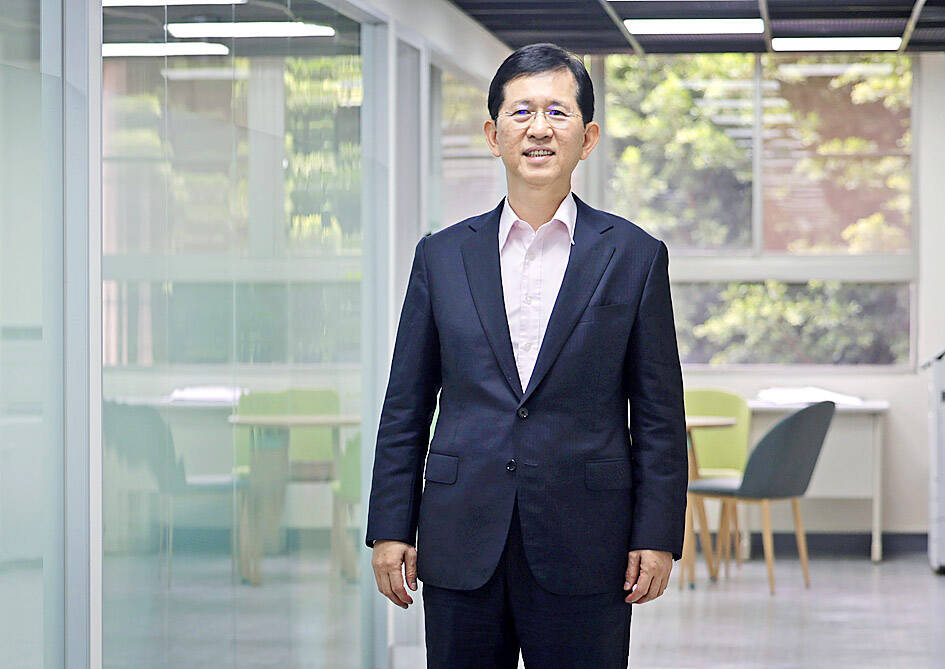Minister of Digital Affairs Huang Yen-nun (黃彥男) yesterday presented his plan to increase the value of Taiwan’s digital market economy to more than NT$1 trillion (US$30.98 billion) within two years.
The Ministry of Digital Affairs’ role is to encourage profit, and as such, its policies should be geared toward assisting with industrial growth, Huang said in an interview with the Chinese-language Central News Agency.
With a global focus on the digital economy, Taiwan should play to its strengths, which would be industries related to artificial intelligence (AI), he said, adding that they remain his priority.

Photo: CNA
Huang said he has three main policies, the first of which is fostering AI “eco-parks” as government measures to develop a digital economy.
He has discussed with National Development Council Director-General Paul Liu (劉鏡清) what incentives would attract foreign and local AI companies to invest in such parks, Huang said.
While the policy is still under discussion, the goal is to have one eco-park in the south and one in the north of the nation, he said, adding that the ministry considers this a vital policy point and hopes to complete all planning by the end of the year.
The ministry is encouraging the Taiwanese information security industry to seek opportunities abroad, Huang said.
Taiwan’s strengths lie in combining software and hardware in one cohesive product, for example, possibly by integrating information security with the Internet of Things, which would help create a digitally secure cloud service that users feel more secure using, he said.
“Software is everything in the future,” Huang said, adding that Taiwan would acquire significant business if it could create packaged solutions applicable to the agricultural, medical and manufacturing sectors.
The second policy is to prevent scamming by having the ministry create a Web site that identifies whether a number belongs to scammers, he said.
The third is to build up information security resilience, Huang said.
He has been sent proposals to amend the Cybersecurity Management Act (資通安全法), which would empower the ministry’s Administration for Cyber Security to inspect the level of information security at government offices, Huang said.
Backing up information to the cloud should be encouraged, and encryption technology, including quantum encoding, should be further researched and utilized, Huang said.
The ministry hopes to popularize the concept of “zero trust” and the use of multifactor authentication technologies, which would significantly deter hackers from accessing internal networks even if a password is leaked, he said.
Asked about the US demanding that ByteDance Ltd (字節跳動) divest TikTok’s US assets or face a ban, Huang said that Taiwan would not take the lead on implementing similar policies, but would continue to monitor developments.
However, he said he “hoped it would come to fruition,” as Taiwan could link to TikTok’s US servers.

The Ministry of Foreign Affairs (MOFA) yesterday said it is closely monitoring developments in Venezuela, and would continue to cooperate with democratic allies and work together for regional and global security, stability, and prosperity. The remarks came after the US on Saturday launched a series of airstrikes in Venezuela and kidnapped Venezuelan President Nicolas Maduro, who was later flown to New York along with his wife. The pair face US charges related to drug trafficking and alleged cooperation with gangs designated as terrorist organizations. Maduro has denied the allegations. The ministry said that it is closely monitoring the political and economic situation

Conflict with Taiwan could leave China with “massive economic disruption, catastrophic military losses, significant social unrest, and devastating sanctions,” a US think tank said in a report released on Monday. The German Marshall Fund released a report titled If China Attacks Taiwan: The Consequences for China of “Minor Conflict” and “Major War” Scenarios. The report details the “massive” economic, military, social and international costs to China in the event of a minor conflict or major war with Taiwan, estimating that the Chinese People’s Liberation Army (PLA) could sustain losses of more than half of its active-duty ground forces, including 100,000 troops. Understanding Chinese

UNRELENTING: China attempted cyberattacks on Taiwan’s critical infrastructure 2.63 million times per day last year, up from 1.23 million in 2023, the NSB said China’s cyberarmy has long engaged in cyberattacks against Taiwan’s critical infrastructure, employing diverse and evolving tactics, the National Security Bureau (NSB) said yesterday, adding that cyberattacks on critical energy infrastructure last year increased 10-fold compared with the previous year. The NSB yesterday released a report titled Analysis on China’s Cyber Threats to Taiwan’s Critical Infrastructure in 2025, outlining the number of cyberattacks, major tactics and hacker groups. Taiwan’s national intelligence community identified a large number of cybersecurity incidents last year, the bureau said in a statement. China’s cyberarmy last year launched an average of 2.63 million intrusion attempts per day targeting Taiwan’s critical

‘SLICING METHOD’: In the event of a blockade, the China Coast Guard would intercept Taiwanese ships while its navy would seek to deter foreign intervention China’s military drills around Taiwan this week signaled potential strategies to cut the nation off from energy supplies and foreign military assistance, a US think tank report said. The Chinese People’s Liberation Army (PLA) conducted what it called “Justice Mission 2025” exercises from Monday to Tuesday in five maritime zones and airspace around Taiwan, calling them a warning to “Taiwanese independence” forces. In a report released on Wednesday, the Institute for the Study of War said the exercises effectively simulated blocking shipping routes to major port cities, including Kaohsiung, Keelung and Hualien. Taiwan would be highly vulnerable under such a blockade, because it